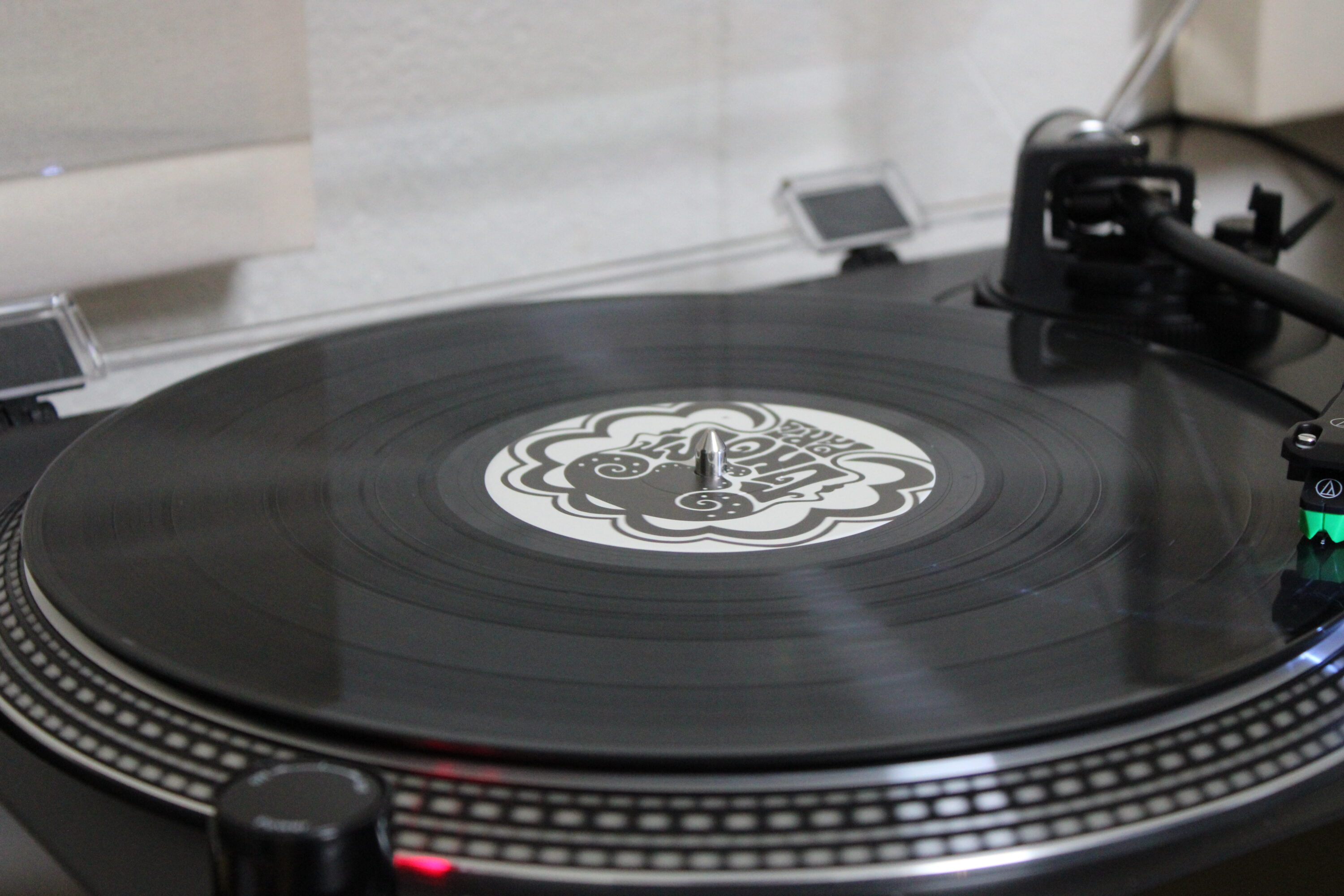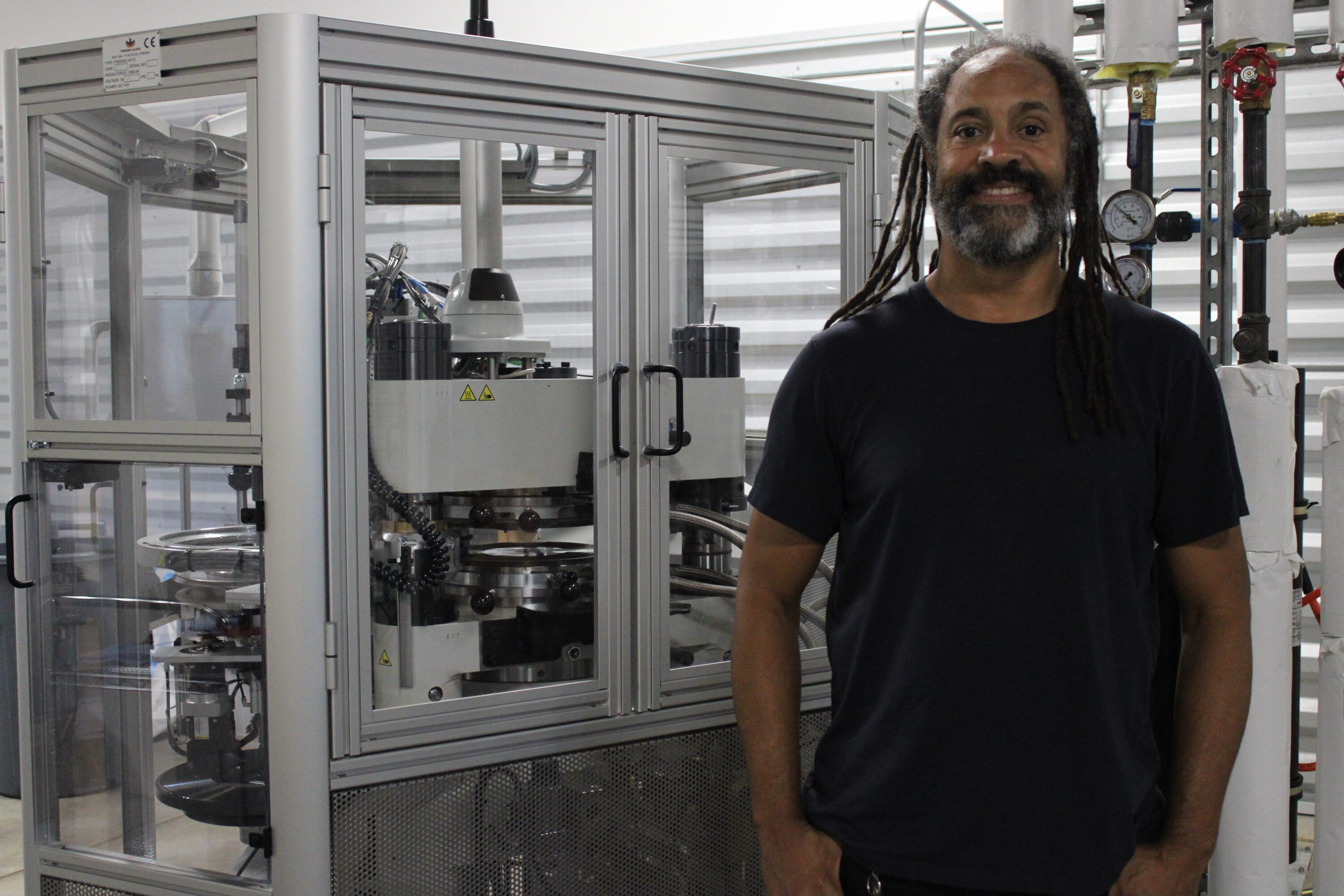
Patricia Ortiz/Houston Public Media
610 Record Manufacturing takes tiny PVC pellets and turns them into plastic pucks which are then flattened with metal stamps that have the grooves needed to hear music from a vinyl record.
It’s the first vinyl record manufacturer in the Houston area, and it’s located within the East End’s $38 million innovation hub that opened three years ago. Joel Hoyle is the owner of the manufacturer.
“I don’t remember a day without music, but I do remember being about 8 years old, riding in the car with my parents… one of them asked what I wanted to be when I grew up, and with no hesitation at all whatsoever, I was like, ‘I wanna be President of United States and a rock star,’” he said with a laugh.
Hoyle’s first instrument was a guitar. He started playing when he was about 13 years old, and said he got into a band as soon as possible. He even got the chance to hit the road a few times.
“I got called ‘band mom.’ The one who handled all the business stuff in the band,” he said.
As he got older, Hoyle eventually chose to get a suit-and-tie job to pay the bills. But he quickly learned he didn’t “really get along well with Corporate America”. He began thinking about opening his own business and eventually settled on a vinyl-pressing facility. He officially opened up the shop on June 10 of this year, in honor of the company name.
The New York Times reports vinyl records are now the music industry’s highest-grossing physical format. According to Billboard charts, 2023 was also the 18th consecutive year vinyl album sales grew in the U.S.

Patricia Ortiz/Houston Public Media
Hoyle said music lovers like the physicality of records.
“Getting [the record] nice and clean, turning the table on, the whole ritual. Everything about it. Putting the needle on, waiting for that sound to come in. Especially with something you haven’t heard before,” he said. “…I think also, maybe on a little bit larger scale, everything being attached to the digital world more so every day, I think kinda human nature, we like things that we can physically hold in our hand.”
Some music experts will argue vinyl has the best sound because its frequency is usually closer to what the human ear can hear. According to the National Institute of Health, humans can detect frequencies from 20 Hz to 20kHz.
Vinyl records can have frequencies ranging from 7Hz to 50kHz according to Furnace Record Pressing, the largest vinyl-pressing manufacturer in the nation. Furnace Record Pressing was acquired by the heavy metal rock band, Metallica, just last year as reported by Variety.
“That’s why a lot of people describe the sound of records as being natural and warm,” Hoyle said. “And it’s true, it’s because it is. It’s a natural fit to our ears. … if you’re going for pure, direct replication of sound, a CD is probably gonna be one of the best things.”
He said CDs and records are some of the best ways to support smaller artists.
“Unless you’re large enough to get the good streaming contract, you’re not making any money from streaming,” he said. “You’re making money from selling something like records.”
Customers of vinyl-pressing manufacturers can range from independent artists and bands to record labels and managers. Hoyle said he’s only had a few customers so far, but his first one was a Houston-area band named Ghost Party.
Local artists have a chance to listen to the master copy of their vinyl record in person, which Hoyle said speeds up the manufacturing process because he doesn’t have to ship the record back and forth if the artist isn’t satisfied with it.
In the past, record-making has come with environmental concerns. According to a report from the Vinyl Record Manufacturers Association and Vinyl Alliance, found that 50% of emissions that come from record-making stem from the PVC material it’s made out of. Still, the environmental impact of buying a record is significantly smaller than filling up a car with a tank of gas, according to the report. Hoyle also said the process has become more environmentally friendly over the years and there are still more ways to keep improving.
“Old school pressing plants were notoriously dirty, grimey places. Hydraulic oil all over the floor, steam flying everywhere, and dumping a lot of water down the drain. Pretty much no record-pressing plant on the planet does that anymore. … much more environmentally conscious industry, which is absolutely fantastic,” he said.
Hoyle said he’s hoping to eventually reach out to some schools in the area to get added to field trip lists and teach the youth about record-making. But for now, he’s mostly focused on reaching out to more local artists.
“People have different names for it. I call it Houstonitis. A lot of people in Houston still seem to think that we’re an underdog city in the music world, and we’re not,” Hoyle said. “This is where the talent’s from.”




![Tyson Foods Plant [Photo: Food Manufacturing]](https://southarkansassun.com/wp-content/uploads/2023/08/iStock_1185520857__1_.5e441daa51cca-600x337.jpg)







![Silverado Senior Living Management Inc. [Photo: Los Angeles Times]](https://southarkansassun.com/wp-content/uploads/2023/10/download-6-4-600x337.jpg)

![China's Wuhan Institute of Virology [Photo: Nature]](https://southarkansassun.com/wp-content/uploads/2023/09/d41586-021-01529-3_19239608-600x337.jpg)
















